

Updated December 20, 2024
In today's competitive job market, job seekers and employers regularly ghost each other. Companies that experience high rates of ghosting should identify and resolve common causes of miscommunication.
In June 2018, a LinkedIn article about ghosting went viral. People are ghosting their potential employers, the article claims, and it’s derailing the recruiting process at companies everywhere.
Workplace ghosting occurs when a candidate abruptly disengages from the interview process without explanation. Sometimes, candidates even ghost after accepting a job offer; they simply never show up for their first day, despite a company’s attempts to contact them.
Looking for a Human Resources agency?
Compare our list of top Human Resources companies near you
Meanwhile, job seekers report that companies frequently ghost them, ceasing to follow up or schedule next steps.
No matter who initiates it, ghosting signals a failure of communication.
We surveyed 507 full-time employees to learn about their experiences with workplace ghosting. You can use this report to understand job seekers’ attitudes about ghosting and their experiences with companies ghosting them.
Hiring managers can use this data to reduce ghosting by identifying and addressing problems in the recruiting process.
Job seekers today believe it’s acceptable to ghost, but they are also frustrated with companies that disengage without warning.
Overall, most people believe ghosting is unacceptable, no matter who does it.
Only 59% of candidates find ghosting unreasonable when they ghost a company, compared to 68% find it unreasonable when a company ghosts a candidate.
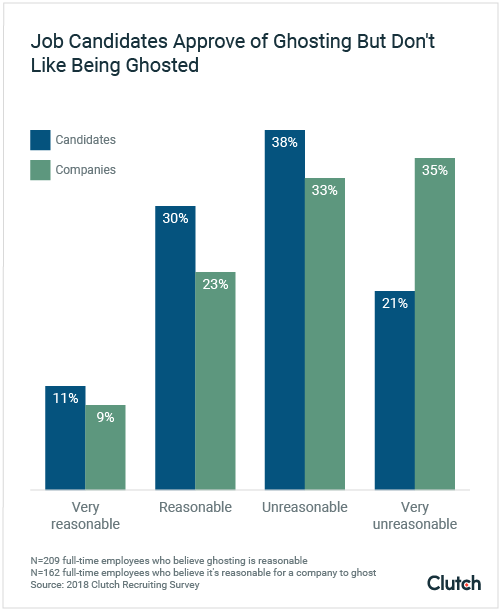
Job seekers, however, believe that it's more reasonable when they ghost a company, compared to when a company ghosts a candidate. The smallest percentage of job seekers (9%) believe it’s “very reasonable” for companies to ghost candidates, compared to 35% who believe it’s “very unreasonable” for companies to ghost candidates.
Ultimately, job seekers believe it is more reasonable for applicants to ghost companies (41%) than for companies to ghost applicants (32%).
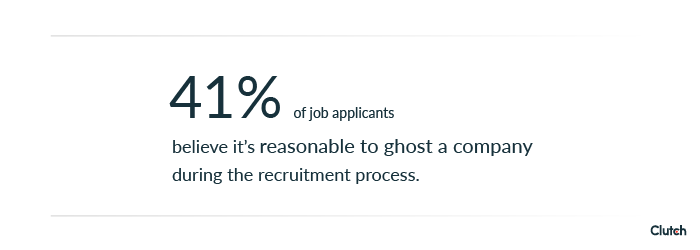
Ghosting is a common practice during the recruiting process.
People agree that ghosting becomes less acceptable as the interview process progresses.
It's more acceptable to ghost in the early stages of the recruiting process, before either side has committed significant time and energy.
Among job seekers who believe ghosting is reasonable, nearly half (48%) say it’s reasonable to ghost during the early stages of an interview process.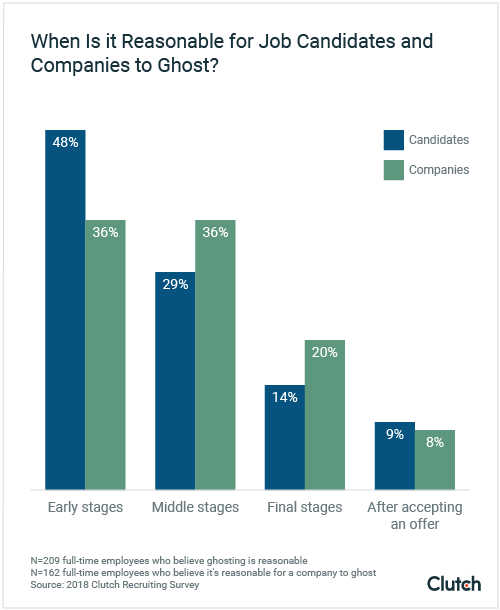
During the middle stages of an interview process, when companies are evaluating and comparing candidates, it becomes more reasonable for a company to ghost a candidate.
Surprisingly, nearly 1 in 10 people say they think it’s reasonable for companies (8%) or candidates (9%) to ghost after a job offer has been extended and accepted.
The strong economy may explain why candidates feel comfortable disengaging from the interview process and why companies are competing for their favor.
In 2015, CareerBuilder, an employment website, surveyed candidates and hiring managers and concluded that “power has been shifting from the employer back to the candidate.”
In 2017, this trend continued as job market steadily improved, peaking in the fourth quarter when unemployment hit a 17-year low.
A strong economy means candidates have more jobs to choose from. As a result, they feel less pressure to communicate with every company that interviews them.
Companies should expect to be ghosted during the recruiting process.
Nearly three-quarters of job seekers (71%) have abandoned the application process.
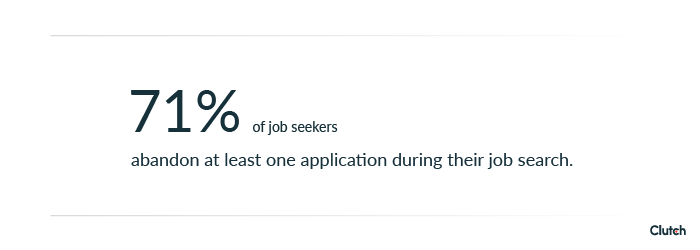
Approximately half (52%) say they abandoned 1-5 applications during their last job search.
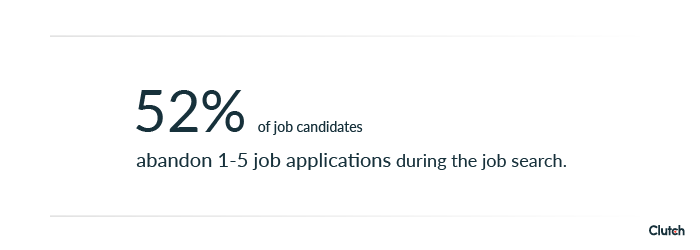
Ghosting signals an applicant’s decision to take their job search in a different direction, albeit without communicating that to a company.
Marissa Connell is currently seeking a public relations job. She believes companies have to be competitive to attract talent.
“If you’re applying for a lot of jobs, and you’re dealing with one company that’s [just] okay, but another one looks really good, you might try to fade away,” Connell said.
Connell ghosts by simply never scheduling next steps. She’s more likely to ghost if she learns that a job listing she applied to didn’t accurately represent the role.
“You can usually figure out if the job posting was honest and really what you’re looking for,” Connell said.
In the past, Connell has ghosted companies that have been unwilling to answer her questions or share more information about the role.
Still, Connell draws the line at ghosting during the late stages of an interview process. “I’d never set up an interview and not show up in person,” she said.
Abandoning a job application is a normal part of the job search.
For companies, the most frustrating aspect of ghosting is the complete lack of communication, which limits insights into what could be causing applicants to disengage.
We found that job seekers’ most common reasons for ghosting include:
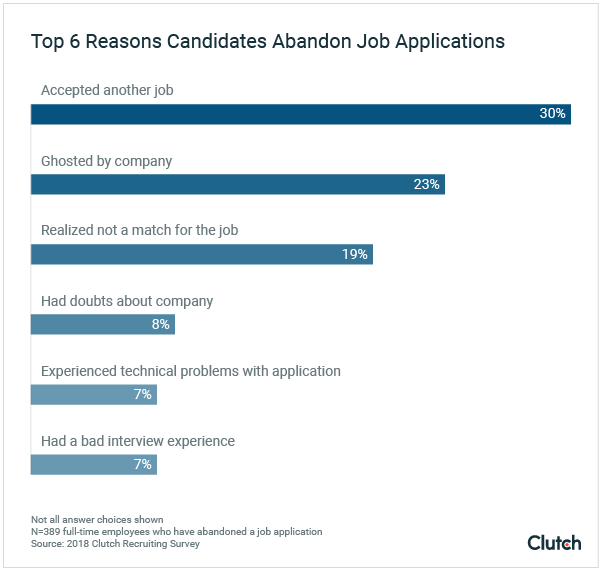
Candidates’ opinions of companies that ghost are often informed by personal experience: Nearly one-quarter of job seekers (23%) have abandoned job applications because a company ghosted them.
This data reinforces the message that communication during the recruiting process is a two-way street.
When a small PR company ghosted Connell after completing two rounds of interviews, she felt embarrassed.
“I spoke to the owner,” Connell said. “She even asked for references. She never called any of them, and I never heard back.”
Like most candidates, Connell finds the job search to be an emotional rollercoaster.
“You get excited and think it’s about to be a really great opportunity, and then nothing ever comes of it,” Connell said.
“You get excited [about a job] and think it’s about to be a really great opportunity, and then nothing ever comes of it.”
Job seekers, however, are often unaware of the complicated internal dynamics that impact hiring decisions. At FullStack Labs, a software development firm headquartered in Sacramento, Calif., CEO David Jackson empathizes with candidates he rejects.
“You always tend to think, ‘What did I do wrong?’” Jackson said. “More often, there are so many internal dynamics within a company and organization that play into how it makes a hiring decision.”
For example, candidates may not be aware of other applicants who have already advanced through the recruiting pipeline or hiring freezes due to changes in executive staffing.
As companies manage these internal complexities, they risk ghosting candidates who are otherwise highly engaged in the interview process.
For candidates and companies alike, ghosting is a communication failure.
Because applicants typically speak with multiple members of a company, lines of communication can become unclear.
More than half (54%) interview with a manager or team leader, and approximately one-third (32%) speak with a human resources representative.
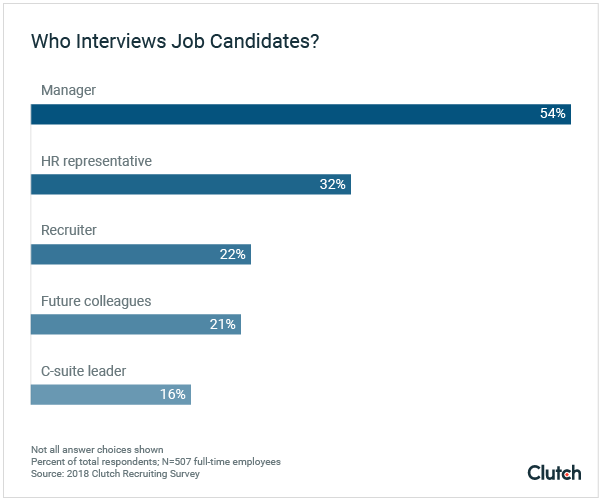
Roughly one-fifth of candidates also interview with their future peers (21%) or other members of the company (18%).
Despite personal contact during interviews, candidates rarely receive a personalized rejection.
Only 21% of candidates are rejected over the phone. A mere 13% say they received a personalized rejection email.
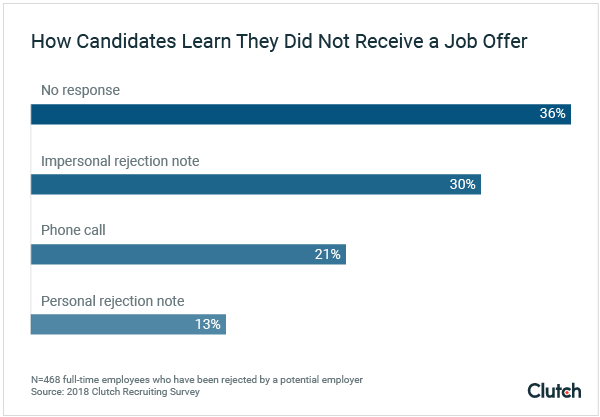
Nearly 40% of job seekers (36%) receive no response at all when a company rejects them.
Elly remembers feeling hopeful about a job opportunity at a major Silicon Valley firm. (Because her job search is ongoing, we are only using her first name.) She completed two phone interviews and one in-person interview before waiting to hear the next steps.
“I understand not responding to a general application, but after a phone interview, I would expect at least a generic email, and after three interviews, I thought some sort of rejection message was standard,” Elly said. “I followed up twice with the hiring manager, who I spoke with on the phone and in person, but never received a response.”
As a hiring manager herself, Elly strives to fall into the 30% of interview processes that end with a generic rejection email.
“I always try to give some sort of closure to applicants,” Elly said.
Companies should establish clear lines of communication and provide at least a generic rejection when they decide not to hire an applicant.
Two solutions companies can use to curb communication issues include:
Template rejection emails help hiring managers, who communicate with dozens of candidates, provide the closure that job seekers like Elly crave.
Companies also rely on templated emails because they contain language that is already vetted for clarity.
“We don’t necessarily use template emails to save time but because they’re carefully worded to be polite,” Jackson said. “It’s difficult to tell someone they’re not going to move forward.”
Once a candidate advances through FullStack Labs’ pipeline, Jackson sometimes customizes a template to provide a more personal message. Too much detail, however, can invite unwelcome debate or even legal complications.
“We don’t want to get in a discussion of why they didn’t get selected,” Jackson said. “It’s not helpful for them or us.”
“We don’t want to get in a discussion of why [an applicant] didn’t get selected. It’s not helpful for them or us.”
In general, a template rejection should thank a candidate for their time and let them know they will not continue the interview process.
For job seekers who might be tempted to ghost, it’s helpful to draft a generic message letting companies know that you will not continue the interview process. You can find examples of these letters online.
Rather than ghosting, companies and candidates alike should use template emails that take the guesswork out of communication.
Staffing firms can help companies communicate with candidates throughout the interview process.
At Addison Group, a staffing and consulting firm headquartered in Chicago, Senior Vice President Heather Tarrillion notices that many companies struggle to manage their talent pipelines.
“Internal recruiting departments are spread extremely thin,” Tarrillion said. “They’re responsible for recruiting for all types of roles within their specific company. You name it, they’re recruiting for it.”
The sheer volume of applicants leads to missed opportunities for follow-ups or conversations about future opportunities.
Staffing firms work with job seekers as they navigate multiple application processes. They maintain longer relationships with candidates and share future opportunities even when candidates are rejected for a specific job.
Staffing firms can also offer insight into how competitors attract and retain top talent.
“We’re here to make sure [companies are] locking in the expertise and talent that they need to make their department more successful,” Tarrillion said.
Whether you hire a staffing agency or put new processes in place to curb miscommunication, you should ensure that your company doesn’t ghost candidates.
Countless articles warn that ghosting puts job seekers’ professional reputations at risk. This is especially true for the 22% of job seekers who work with staffing firms to find their next role.
At Addison Group, Tarrillion is often surprised by how many candidates return each time they search for a new job. She and her colleagues document every conversation with candidates – including every time they attempt to reach a candidate who ghosted.
“In those ghosting situations, everything is logged in our database,” Tarrillion said. “It’s very evident to see if someone was ghosting.”
“It’s very evident to see if someone was ghosting.”
Tarrillion recommends that candidates send a simple follow-up to say they are off the market or explain unexpected extenuating circumstances that interrupt communication.
When a ghost returns to Addison Group for help finding a new job, Tarrillion tries to determine whether they will repeat the behavior.
“I always like to see how their follow-up is now,” Tarrillion said. “I want to ensure that they’re serious about their search.”
For candidates who do not work with a staffing firm, reputation risks are somewhat lower. The sheer number of companies and candidates leaves little room for companies to receive warnings about habitual ghosts.
“We have thousands of people passing through our funnel,” Jackson said. “ If people are changing jobs every four or six months, that’s always a red flag for us. Outside of that, we have not run into a reputation issue.”
Still, candidates should be aware that ghosting almost certainly burns bridges with the hiring manager who they ghost.
For companies, persistent ghosting should trigger reflection and process improvements – not just dismay.
Jackson believes persistent ghosting can be a warning sign that companies are losing talent to competitors.
“If we’re losing good candidates because of a problem with our process, that could be having a bigger impact than we’d like,” Jackson said.
Many job seekers ghost because they are simply focused on other opportunities. Nearly one-third of job seekers abandon the recruiting process when they're offered another job.
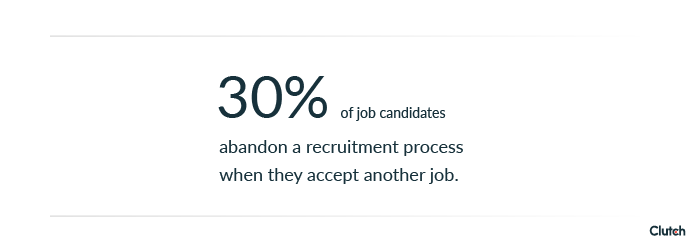
At ThinkLions, a Detroit-based mobile app development company, CEO Mike Sims estimates that his recruiting process resulted in nearly half of candidates ghosting.
Sims hypothesized that candidates were reluctant to move to Detroit, a city that’s better known for its central role in the automobile industry than its burgeoning startup scene. Sims suspected that candidates who ghosted were accepting offers from companies in better-known tech cities such as San Francisco.
To test his theory, Sims offered candidates the option of working remotely instead of relocating to Detroit. Before long, candidates began accepting his job offers.
“I was a bit nervous going in, but we weren’t having the success that we wanted with the onsite [openings],” Sims said. “It’s definitely working out for us.”
By identifying and addressing a possible cause for ghosting, Sims limited its impact and attracted new talent.
Companies that experience ghosting should evaluate whether process changes can reduce its impact.
You can use these questions to spark a review of your current recruiting process and identify areas for improvement.
Even though ghosting is defined by a lack of communication, Sims still reaches out to candidates who have ghosted him.
“Sometimes they’re inconsiderate or embarrassed and won’t contact you at all,” Sims said. “Sometimes they will give you a reason why.”
Companies that experience high rates of ghosting should take steps toward figuring out why it occurs.
As unemployment decreases, job seekers can be selective about where they want to work. Companies must be competitive to attract and retain talent.
Although nearly half of job applicants believe it's reasonable to ghost companies they are no longer interested in, most say it's unreasonable for companies to ghost candidates.
Companies should evaluate their recruiting process to determine if any steps trigger ghosting. For candidates, it may help to recognize that companies sometimes ghost unintentionally as a result of shifting internal dynamics that complicate the hiring process. Staffing firms can bridge the gap between candidates and companies.
Job seekers and businesses alike can benefit from improved habits of communication.
Clutch surveyed 507 full-time employees who started a new job within the past 6 months. Respondents work in a variety of settings, including large businesses with more than 500 employees (35%), medium businesses with 250-500 employees (20%), small businesses with fewer than 250 employees (19%), startups (17%), and miscellaneous other businesses (9%).
A range of industries were represented, including retail/hospitality (21%), healthcare (16%), technical services (10%), business/legal/financial (9%), education (9%), government (5%), advertising/marketing/PR/media (5%), and miscellaneous other (25%).
Respondents came from all regions of the United States: South (47%), Midwest (21%), West (16%), and Northeast (13%).
Women (69%) and men (31%) were included in the survey. Respondents ranged from millennials aged 18-34 (66%), Generation X aged 35-54 (29%), and baby boomers aged 55 and over (5%).


